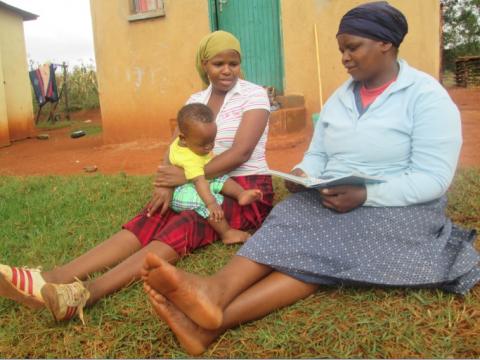Timed and Targeted Counseling - a new curriculum for Maternal and Child Health

Since 2010, World Vision has been working to strengthen its Health programming global through the 7-11 strategy, which focuses on evidence-based, cost-effective preventive practices that address the primary causes of maternal and child mortality and illness, realised within a framework for household, community and health systems support. The 7-11 strategy was a great turning point for the World Vision Partnership, bringing health programs into alignment, enabling us to do more with funding, be more sustainable, and align more closely with Ministries of Health to ensure long term support for community and health systems. In 2010, WV developed a curriculum and approach called Timed and Targeted Counselling (ttC) for health and nutrition. The approach is implemented through home based visits which engage mothers alongside the key family decision makers, especially the husbands and fathers, in counselling to promote the adoption of healthy practices for the pregnant mother and baby. The ttC methodology applies a story-telling approach, as per ANMC's Home-Based Life Saving skills, but uses positive and negative stories that emphasise the role of men. The counselling technique is based on barriers analysis and negotiation using a household Handbook – where families are able to track their own path to health.
TTC has rapidly become one of the most widely implemented core models for health, and is currently being implemented in 22 countries, with a further 9 countries planning to implement in the next year. TTC has been shared widely and adapted for use in diverse contexts, including fragile settings, large scale national government led programmes and community-led Care group programmes. Evidence studies have been conducted in 3 countries, and a further 8 have operations research underway, including a 4-country CHNIS (Child Health and Nutrition Impact Study) undertaken with Johns Hopkins University.
The TTC curriculum covers pregnancy and the first thousand days of life which contribute to the highest burdens of mortality and the greatest opportunity for effecting lasting change for the child which will set them on a better path for life-long health. TTC was reviewed alongside CHW training materials for SRMNCH, and was shown to be one of the most comprehensive materials in terms of its technical content, and spectrum across the continuum of care[1]. However, in this study the WHO identified various gaps present in most or all materials, which notably included the integration of interventions for early child development, gender based violence and others. Furthermore, new evidence is emerging, particularly around interventions such as chlorhexidine cord cleaning for the newborn, improvements to prevention of mother to child transmission of HIV (PMTCT) and paediatric HIV, early child development, and maternal mental health. The evidence for these components strongly support an approach to programming that is integrated within basic MNCH activities.
To align to these new recommendations, as well as incorporating field experiences from over 20 countries, WVI has create a revised product for the global health community that continues to offer value-add for community health programmes, and specifically seeks to fill some of these crucial gaps, whilst still applying the timed and targeted counselling approach adopted for CHW, Care groups and volunteers of low to medium literacy.
The new curriculum aims to enable WV and partners to include elements of support for in particular, perinatal mental health and child development. TTC-2 tries to see 'the whole picture', increasing awareness about the barriers to both physical and emotional health of individuals. Taking a more family-centred approach, ttC-home visitors will learn practical skills for understanding barriers to health and nutrition, ensuring positive engagement of fathers and decision makers. In order to provide appropriate support to the most vulnerable families, they are also trained to tailor visiting to those most at risk, respond to situations of family difficulties such as violence and psychosocial difficulties, and also to teach parents and caregivers the basic skills for engaging children for early child development from birth.
Sounds like too much? Provisional feedback from discussions with Ministries of Health in Ghana and Kenya suggest that this is very much in alignment with current thinking in the countries. Not only that, but when considering providing support to women experiencing violence during pregnancy or post-partum, experts in Kenya reported that CHWs face these kinds of issues, sometimes on a daily basis, but don't have the practical skills training which enables them to respond appropriately.
In the global north, public health systems have operated under a model of social inclusion for some time, in which social and public health services are integrated, especially through the activities of home visitors such as community health visitors and community midwives. It's a fact that not all families are the same, child and maternal mortality is not even distributed through the population, but skewed heavily towards the lower economic groups and vulnerable or marginalised individuals and families. Evidence from a study in Ethiopia supports a 'dose-response' effect for TTC visiting, suggesting that additional supportive care targeting the most vulnerable homes is well justified, particularly where the mother or child have specific challenges to health such as adolescent mothers, HIV / AID affected families, single mothers without social support, to name a few. A 'one-size fits all' community health strategy that doesn't accommodate social determinants of health is likely to continue to exclude the most vulnerable. So we might see great results in terms of health uptake and coverage, but the impact on mortality will remain limited. The TTC2 approach uses existing risk factor analyses to ensure inclusion and supportive care for these families is given priority.
World Vision is launching the TTC 2nd edition online – http://www.wvi.org/health/timed-and-targeted-counseling-ttc, and also on the mPowering platform.
[1] www.popline.org/node/579690
Author: Polly Walker, CHW Programming Advisor
polly.walker@worldvision.org.uk
Photo: Taken at WHO offices in Geneva, participating in the CHW curriculum review workshop, whilst 6 months pregnant!